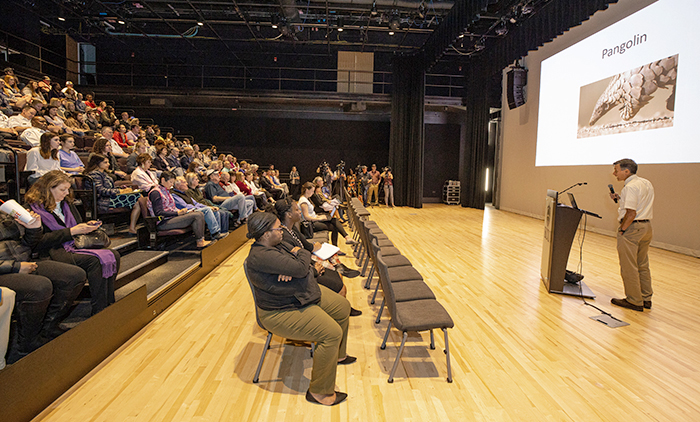Publisher's note: The author of this post, Rob Spahr, is a contributor to ECU News Services.
Dr. Paul Cook, chief of the Division of Infectious Diseases at ECU’s Brody School of Medicine, gives a pop-up lecture titled, “Coronavirus: Real threat or real hype?” on March 2, 2019. | Photo: Cliff Hollis
ECU Experts
ECU’s Division of Health Sciences has experts available to answer questions related to Coronavirus disease 2019 (COVID-19) and other infectious diseases.
Infectious diseases: Paul Cook, MD, chief of Brody’s Division of Infectious Disease
Clinical operations: Jason Foltz, DO, chief medical officer of ECU Physicians
Employees & students: Paul Barry, MD, director of ECU’s Office of Prospective Health
Public Health: Ronny Bell, PhD chair of Brody’s Department of Public Health
Research: Rachel Roper, PhD, associate professor in Brody’s Department of Microbiology and Immunology
Media contact: Rob Spahr,
spahrr18@ecu.edu, 252-744-2482 or 252-328-6481
A day before
North Carolina joined the growing number of places in the world affected by Coronavirus disease 2019 (COVID-19), approximately 200 people filled ECU's Black Box Theater on Monday for a lecture titled, "Coronavirus: Real threat or real hype?"
Dr. Paul Cook, chief of the Division of Infectious Diseases at ECU's Brody School of Medicine, explained to the crowd - composed of students, faculty, staff, community members and first responders - how COVID-19 is related to other coronaviruses and influenza, and also discussed ways to prepare for the possible pandemic.
Cook explained that the impact of COVID-19 is constantly evolving because of a variety of factors, such as the limited testing being done for the coronavirus in the U.S. and the lack of symptoms that most people with COVID-19 present-but can still transmit it to others.
As Cook finalized his lecture preparations Monday morning, there were approximately 89,000 cases of COVID-19 reported worldwide, including 86 cases and two deaths in the United States.
"There's no way that that number is accurate, because we haven't been testing people. And if you don't test people, you don't get a positive," Cook said.
"So this number is certainly going to be much higher, probably in the next couple days."
By the time Cook's lecture ended at 3 p.m., there were 105 confirmed cases and six deaths
reported in the U.S.
Below are 10 key takeaways from Cook's discussion on Monday:
- Coronaviruses are common viruses: "Before 2002, these were thought to be 'common cold' viruses, and there are still are coronaviruses that are common cold viruses." But after people started dying from the SARS coronavirus in 2002 - and also the Middle Eastern Respiratory Syndrome (MERS) coronavirus in 2012 - more research has been devoted to understanding and treating the viruses.
- Who COVID-19 impacts: Adults are more at risk, with most of the serious cases involving older people or those with underlying health issues. Health care personnel are also getting this disease at a very high rate. "Children don't seem to get this disease, or if they get this disease they do very well. That is true with a lot of viral infections, but it seems to be particularly true with this one." Cook warned that even though children do well with COVID-19, they can still pass it to their adult family members.
- The spectrum of the disease: Most people carrying COVID-19 either have mild disease or no symptoms. "That's very important because if somebody is sick, it's easy to know that they need to be isolated. If somebody has no symptoms or has a symptom like a cold, they're less likely to be isolated, and as a result, those persons are more likely to transfer the disease to somebody else. That's a problem."
- Stop buying masks: "Number one, it doesn't work and it probably makes things worse." Even when people are wearing masks they tend to touch their masks and their faces, which is how the disease is transmitted. "If we're in the hospital and seeing people, that's different. But if you're out at the mall or at the airport, these things are a waste of time, a waste of money and they're probably making things worse."
- Practice good sneezing and coughing etiquette: Don't sneeze or cough in your hands, do it into your elbow. And after you do that, wash your clothes. If you do sneeze or cough in your hands, wash your hands with soap and water.
- Stop shaking hands: "Shaking hands is not good. When these politicians come here and they want to shake your hand, think about everyone else's hands they shook. Don't do that. There's actually literature to support that - the fist bump is actually more hygienic than the handshake. I'm telling you, handshakes are a bad thing."
- Wash your hands: "I don't care how you wash your hands, just wash your hands and use soap and water. It works. As long as you do this or use hand sanitizer, you'll be in good shape."
- Everybody picks their nose: When they test for coronaviruses, it is often done with a swab in a person's nose. "Everyone picks his or her nose. And if you can get coronavirus with a swab, you can get it with your finger." So again, shaking hands is bad and washing your hands is good.
- Will the COVID-19 risk decrease as the seasons change?: "The short answer is we don't know. What we do know is that cold viruses tend to be problematic in the cooler months. But we don't know about this virus, and I think time will tell."
- It's not going away any time soon: Cook said there are projections out of Harvard University that predict that within a few years, 40-70 percent of people in the United States will have had exposure to this virus. "There hasn't been a single case in North Carolina - yet. But there will be, it's only a matter of time. ... So, we need to get prepared without freaking out. Travel restrictions, school closings, quarantines and isolations measures may be necessary to contain infections."
On Tuesday, Gov. Roy Cooper's office released a statement saying a North Carolina person from Wake County tested positive for COVID-19.
Approximately 200 students, faculty, staff, community members and first responders attended a lecture about Coronavirus disease 2019 in the Black Box Theater on Monday.
Cook's talk was the third in a series of pop-up lectures sponsored by ECU's Phi Kappa Phi academic honors society, which works to promote academic excellence in all fields of higher education and to engage the community of scholars in service to others.
"The idea is we have a campus full of experts and these lectures are on timely topics that are of interest to our community," said Dr. J. Christopher Buddo, dean of ECU's College of Fine Arts and Communication, adding that the previous lectures focused on vaping and international relations with Iran.
"We had more community and media interest in this lecture because people are worried. The students are getting ready to go on spring break and are concerned about getting on an airplane, so everybody is thinking out it," Buddo said.
"I think what I came away with is, 'It's coming, but don't panic.' And that's what we needed to hear."


